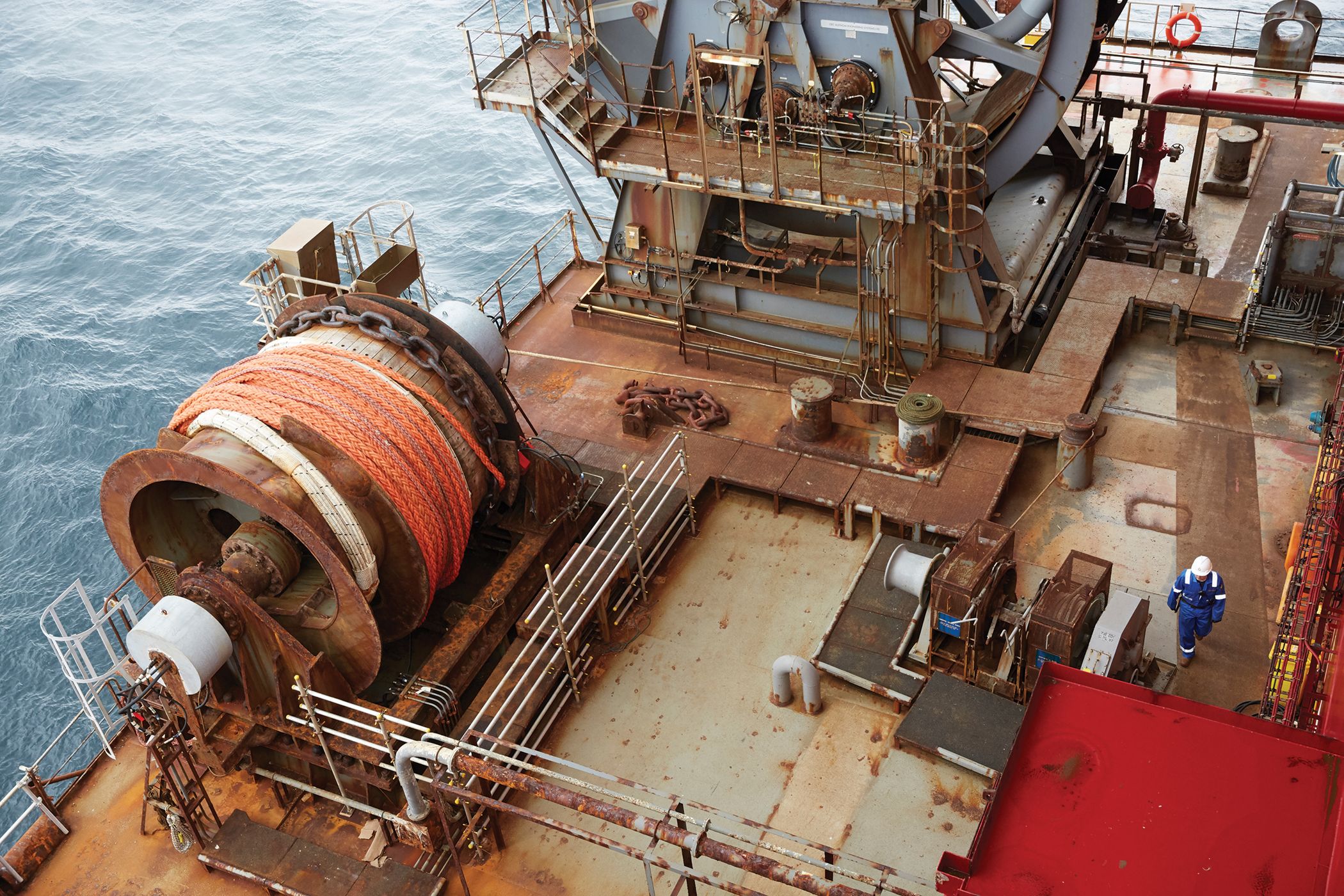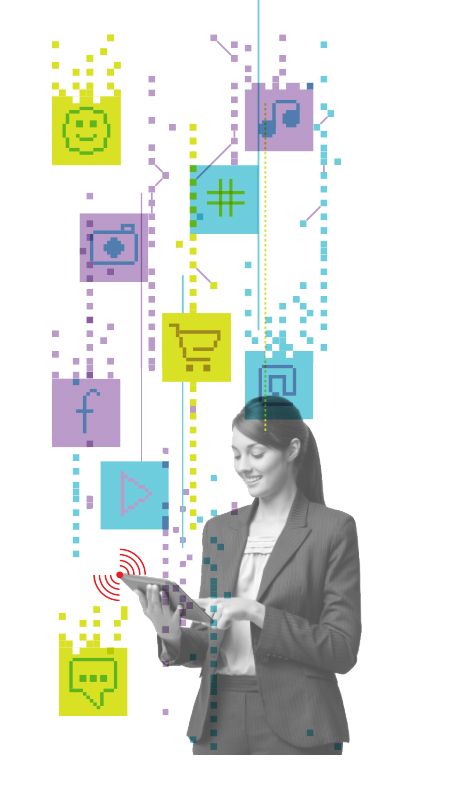Keeping mobile
Supporting our offshore teams to get to and from their worksites, is one challenge our Operations & Maintenance team has adapted to address amid the Covid-19 pandemic. Flexibility and teamwork – along with a little help from technology – is helping keep our critical workers mobile, say Carolyn Milne and Jennifer Walker
HOW WE WORK
“Our first concern was about protecting the wellbeing of our offshore teams and their families.”
Along with our nurses, doctors, delivery drivers and supermarket workers, many in our industry are regarded as key workers. Whether it’s fuelling emergency vehicles or powering our hospitals, offshore workers are critical in providing energy to keep our country running during the Covid-19 pandemic.
But how do we continue to mobilise personnel to assets in the North Sea in these unprecedented times?
At times it’s been challenging, says Operations Director Carolyn Milne and Delivery Hub Team Lead Jennifer Walker. They are both usually based in our Aberdeen office, but like many others in the UK and across the world, they are currently working from home.
As Operations Director, Carolyn is responsible for our Operations & Maintenance contracts and the Delivery Hub, which mobilises all UK offshore personnel for Petrofac. Jennifer is one of four people responsible for overseeing a large team of coordinators and administrators who liaise with Petrofac’s clients and offshore teams. They both joined Petrofac nearly 15 years ago.
Looking after the wellbeing of our workers
Although there has been some down-manning on projects, the team is still mobilising large numbers during the pandemic.
“When this all started, our first concern was about protecting the wellbeing of our offshore teams and their families. We’re lucky to be able to stay safe at home, but we recognised the worry facing those who can’t. Having worked with our clients to put in place lots of precautionary measures to reduce the risk of infection offshore, we then navigated our way through the need to help our people safely travel during lockdown,” explains Carolyn.
The team has been following Oil and Gas UK guidance, while liaising with clients to ensure non-critical work scopes are reconsidered. “We wouldn’t take any risks, so sometimes mobilisations would be cancelled or change,” adds Jennifer. “Initially, it was a challenge to keep on top of the guidelines and stay current as it changed all the time.”
It’s no surprise then that communication has increased during the lockdown. The team has been contacting everyone with upcoming mobilisations to check relevant documentation around Covid-19. Many are leaving their families for weeks at a time which is tough at the best of times, but particularly difficult in this environment.
“We offer a confidential Employee Assistance Programme and have been encouraging our people to use it and talk to someone,” says Jennifer. “Our in-house occupational health department has also been very helpful and phoned them to discuss their concerns. Nothing is too much trouble for them.”
WORDS CHRISTINA McPHERSON
PUBLISHED APRIL 2020

Jennifer Walker (right) with a member of the Hub team
PetrofacGo: A little help from technology
Given how much they communicate with offshore workers, clients and the assets, the team found themselves juggling a lot at the start of the lockdown and took the call to fast-track the launch of their new app.
Launched in March, PetrofacGo has been inspired by the huge popularity of smartphone taxi apps. Personnel can access details for their current mobilisation, including safety messages, heliport and check-in times. Jennifer’s team can use the app to issue and change mobilisation plans, send out push notifications to specific workers to notify them of any changes, and share detailed communication.
“We were, and still are, on a digital journey in Petrofac,” explains Carolyn. “Most people use apps in their personal lives – a lot of our offshore workers travel to reach their worksite and will sit on planes or trains on their phones. We had looked at Uber and thought, ‘Why can’t we do something like this for offshore?’ Our IT, Supply Chain and Digital teams threw their weight behind us and helped make it happen. Everyone has bought into it.”
There are now 1,400 users across our O&M and Duty Holder assets, and there’s no doubt it’s transformed the way the team communicates. “This was always going to be a bit of a game changer,” says Jennifer. “But during the lockdown it has been so helpful. Before we would have been sending letters, emailing and phoning the offshore workers every time there was a change, whereas now we can send a push notification which they receive on their phones within a minute. It’s streamlined a lot of the labour-intensive work we had to do, meaning we can focus time on stuff that adds value to our offshore teams and clients.”
“To put it into context, if there was a change to a check-in time, Jen’s team would have to phone around 50 people to let them know,” adds Carolyn. “The app has made it 100 times easier to get comms out while everyone is working from home during the pandemic.”
The delivery hub explained
Petrofac manages all of its labour supply contracts through a dedicated 24/7 Delivery Hub. The Hub brings together colleagues with knowledge in recruitment, supply, mobilisation, training, assurance and logistics management. Every member of the team works collaboratively across Petrofac’s client portfolio.
By providing the flexibility of shared resources across all of its contracts, the Hub allows Petrofac to manage client needs in a cost-effective, scalable way, while providing 24-hour support seven days a week. Petrofac provides skilled personnel for clients quickly, no matter where they need them, by using local resource pools.

Operations Director Carolyn Milne
“Most people use apps in their personal lives – a lot of our offshore workers travel to reach their worksite and will sit on planes or trains on their phones.”
The new normal: working from home
Before the lockdown came into force in March, precautionary measures had been taken to make sure the business could continue to operate. One half of the team had started working from home with the other half remaining in the office to enable social distancing and reduce the risk of people getting infected.
Now of course the whole team is working from home. So, how have they found it? “I do miss an office environment, but it was amazing how quickly everyone adapted,” says Carolyn.
“I’m sitting at my kitchen table opposite my husband who is also working from home,” says Jennifer. “We set up a regular big video call with the whole team and I think they really appreciated it. Everyone said how much they missed each other and how nice it was to see everyone’s faces.”
“There are some people who don’t like putting on their cameras, but it’s been so important to stay connected and see each other, so we’ve been encouraging everyone to do it,” adds Carolyn.
A successful collaboration
Maintaining delivery at this time has involved lots of collaboration. It clearly wouldn’t be possible without the flexibility of our offshore teams, and beyond the Delivery Hub, our onshore operations leads and functional business partners have massively chipped in to help keep the wheels moving.
“The success of how we’ve continued to mobilise offshore is down to a few things: team collaboration, great attitudes, and the strong work ethic we see at Petrofac,” adds Carolyn.
What’s next for the app?
The app has enabled faster communication and improved efficiencies when it comes to mobilising personnel. In April, a recruitment section will be added to the app, where people can apply for ad hoc roles. In the future, ‘progressive profiling’ will also be introduced, monitoring the skills of users, the roles they look at and their journey within the app. The team plan to evolve that functionality further to enable clients to find the people they need, and mobilise them within two days. Watch this space!

